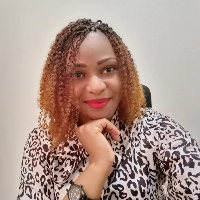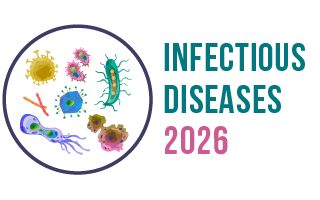4th International Conference on
Infectious Diseases
September 09-10, 2026 | Barcelona, Spain

Infectious Diseases 2026

National Institute of Biomedical Research, Republic Of The Congo
Abstract:
Context
Co-morbidity
linked to dual HIV-malaria infection is a real public health problem because of
the multiple implications for the health of populations living in countries
with limited resources. However, data-t-on malaria-HIV co-infection are lacking
in the DRC. We will contribute to knowledge on the epidemiology and management
of HIV/malaria co-infection in Kinshasa.Objective
This study aims
to provide a clinical and biological profile of people living with HIV (PLHIV)
followed up for malaria at the Bandalungwa Central Military Hospital (HMCB) in
Kinshasa.Methodology
We conducted a
descriptive retrospective study from 1 January 2017 to 31 December 2018 among
PLHIV hospitalised for malaria at the HMCB. We collected
sociodemographic,clinical and biological data from medical records.The data
were transcribed onto a pre-established collection form, entered into Microsoft
Excel 2016® and analysed using SPSS 21.0 software.®Results
We registered
187 PLHIV, 27.8% (40/187) of whom were co-infected with malaria. The mean age
of subjects with HIV-malaria co-infection was 41.7±12 years, and 57.5% (23/40)
of them were female. The majority of subjects with HIV malaria co-infection
[80% (32/40)] had stage 3 HIV infection (WHO classification), and 85% (34/40)
of the study population had uncomplicated malaria. Fever was the most common
symptom [65% (26/40)] in co-infected patients, followed by headache in 37.5%
(15/40), cough in 20% (8/40) and physical asthenia in 12.5% (5/40).
Biologically, 62.5% (25/40) of subjects with HIV malaria co-infection had a
viral load 10,000
copies/ml and 2.5% (1/40)Conclusion
HIV-malaria
co-infection is present in Kinshasa and manifests itself through a range of
symptoms in the majority of PLHIV. Systematic screening for malaria needs to be
incorporated into the clinical and biological monitoring of PLHIV at various
visits.
Biography:
Marithe Mukoka Ntumba is a medical doctor, currently a master's student in management of healthcare institutions (ESC CLERMONT), and has been a Research medical doctor at the Rodolphe Merieux INRB-Goma Laboratory for 3 years in the Sampling and Results Reporting, Immuno-Serology and Clinical Research Departments. She has supervised COVID-19 activities during the pandemic in the eastern region of the country (Goma, Beni, Butembo: 2020-2023) and activities related to clinical and biological diagnosis of infectious and non-infectious diseases (2022-2023).
